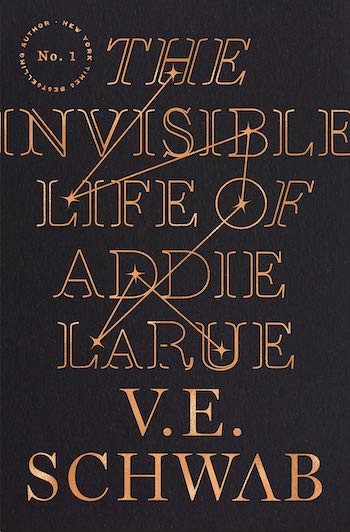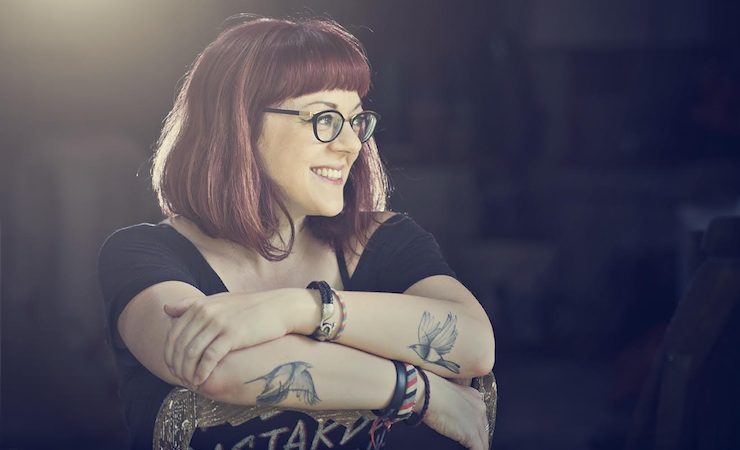In another timeline, Victoria “V.E.” Schwab is in a bookstore in Manhattan, signing books for fans right this very second. But once Macmillan (the parent company for Tor Books) issued a travel advisory, Schwab’s book launch plans had to change. Like many authors, the stay-at-home orders impacted the release plans for The Invisible Life of Addie LaRue, Schwab’s new adult novel. It feels contradictory to talk about Addie’s 300-year-long journey during a year which feels halted in so many ways; to chat with a woman who moves through life with such speed while both of us are stuck behind laptop screens.
I first met Victoria Schwab in 2017, just before the release of A Conjuring of Light, and her work has been a constant in my life ever since. Her signature red bob is a familiar and welcome sight on the other end of a video call, and despite understandable frustrations with life under quarantine, she’s passionate and effusive when talking about her upcoming release.
Addie LaRue, the latest entry into the Schwab portfolio, is an exciting new chapter for the author. The titular Addie makes a deal with a demon (it’s never made clear whether he is The Devil, but this writer enjoys imagining him as the very chic Lucifer as played by Tom Ellis) in exchange for eternal life and the freedom to make her own choices. The small print is that freedom means never forming lasting connections, and Addie is doomed to be forgotten by all those she meets (until, of course, she meets a cute boy in a bookshop). The result of such a life is a deeply emotional character driven novel which ruminates on relationships, memory, and the complexity of choice. Addie’s journey takes place primarily in both France and New York—coincidentally, I spoke to Schwab, who is quarantining in France, from my apartment in Brooklyn.
“The travel advisory was a big relief to me because none of my family or friends wanted me to make that trip across the ocean, because the question was, will I be allowed to come back, even though I’m a UK citizen? So it was like, I’m just gonna be where I am for another six months at least—what do I need to do for sanity’s sake?” She mentions needing to have an ‘internal come to Jesus’ moment, wherein she began to accept that the current circumstances might be more long term than she originally planned. Schwab, who moved to Edinburgh a few years ago but has taken up residency with family, has turned to puzzles and yoga to maintain her work-life balance during this uncertain time. She preaches the pleasures of doing puzzles while listening to audiobooks.
“I dont read fiction of the same ilk when I’m writing fiction. I go through spells of three to six months where all I do is consume memoirs on audio, because they tend to be narrated by the author. I feel like from a craft perspective, it gives me a capsule of a character. I feel like it’s a character study.” Schwab, who refers to herself as a ‘binger’, also enjoys celebrity interviews and podcasts like Dax Shepard’s Armchair Expert and Elizabeth Day’s How To Fail. These act both as windows into human life, and as meditative breaks from her creative outpourings. It makes sense that nonfiction made up the bulk of her reading practices during the drafting of Addie LaRue—the book deals heavily with Addie’s internal monologue, or “headspace” as Schwab puts it. The novel took the better part of ten years to come to fruition, and went through many different versions before taking its final shape.
Buy the Book


The Invisible Life of Addie LaRue
It is clear this book was a labor of serious love, and that the time spent creating the story was an emotional experience for Schwab. She expresses an almost protective attachment to her main character, the lines between fiction and reality becoming blurred. And indeed, The Invisible Life of Addie LaRue is soft on fantasy elements. It is certainly the most grounded of Schwab’s work to date. Addie’s New York feels real enough to walk through, but the decision to set the contemporary scenes in 2014 was deliberate. “I did very specifically choose to set it prior to the 2016 elections. I don’t actually want to write that world. I wanted it to feel super modern because that’s the contrast of Addie’s 300 year life, but I didn’t want this to become about Trumpian politics.” There’s only so much reality she’s allowing in her work.
And it’s understandable that life after Addie feels “like an open grave”—after being close to this work for so long, Schwab is struggling to move forward, especially without the ability to meet fans in person while touring. It seems as if Schwab is standing at the edge, waiting for the next comfortable step to appear. The lack of an in-person tour means a lack of expected closure on this chapter in her career. While there is a full slate of digital events lined up for Addie, she regrets not being able to see everyone’s faces. Zoom events take some getting used to, and can often feel like talking into a void when the audience isn’t visible. “You don’t get the same energy kickback.” Experiencing fan reactions is a crucial part of the book’s lifecycle and her process as a writer.
Having been open about mental health struggles, Schwab feels the dissonance of simultaneously being proud of The Invisible Life of Addie LaRue, and the anxiety of wanting to please her established readership. While fans seem hungry for new work from her, Addie is a new direction she wasn’t sure they would follow. This seems to be a large part of why Addie became a decade-long project.
Though she’s stepped back from social media over the years, she is still hyper-aware of her audience and her platform. Schwab has amassed over 130k followers on Twitter and 148k on Instagram (her preferred platform, on which she has been hosting No Write Way—a series of craft talks with her author friends—as a quarantine project). Numbers like that become a sea of other voices competing with her own. Though it is “a beautiful gift”, social media started to be in conflict with her creative process, and the lack of control over public interactions became a distraction. “How am I meant to follow my own voice when there’s a stadium full of people telling me, ‘you should make it more this, I wish it was more this?’ It’s just emptying. You can’t please everybody and yet I spend so much time trying to please people—not within the books, I’m proud of the books—but within the books reception. I have enough voices in my head telling me the ways in which I’m falling short. I don’t want to go looking for more.”
Still, Addie feels like a natural progression in Schwab’s work, which often centers on characters with appetites for danger and independence. The famous line from her Shade of Magic series, “I’d rather die on an adventure than live standing still,” seems particularly apt for Addie’s story, as well as Schwab’s own life—with varying definitions of ‘adventure’. “The characters are the most distilled iteration of everything I’m always writing about. Maybe there’s less action [in Addie], but there’s so much truth to them”. Schwab herself is a “voracious” person who has been unashamedly vocal about her creative ambitions. It’s part of the Schwab identity—wanting, desiring, going after opportunities with tenacity. With over 20 full-length novels spanning all age groups, a series of comics, and short stories already under her belt, and the recently announced film adaptation of Addie LaRue on the way (for which Schwab has penned the script), she shows no signs of slowing down.
Though, she admits, some time to catch up on projects would be nice.
As a writer, Schwab’s success is due in no small part to her ability to brew darkness in her fantasy worlds. There are clear connective themes in the Schwab-lian oeuvre; she plays in opposites, in the balance between life and death, pain and joy, ambition and fear. She plays in the way these extremes can seduce a person, and how circumstances can move them towards a breaking point. Addie’s characters are decidedly more nuanced, however, than previous casts. The moral lines are blurred in a way that pulls the story away from the fantasy realms of other works. Addie, who Schwab describes as a “hedonist, a self-interested independent entity”, is a character that might simultaneously be called “an unlikeable female character” and “a strong female character”—and she is both. That’s the downside of writing a character that is deeply human in a world that still puts expectations on both female characters and their writers. Schwab is firm in fighting against gender expectations in her work—the idea that men should be tough and women should be nurturing. “One of the hardest points I fought for in Addie was, I don’t think she’s a great person. She’s a super selfish person, because for 300 years she got to be selfish because she had no other choice. And Henry is super fragile. Basically, Henry is who I would be if I’d never found writing. I experience the world the way that Henry experiences the world, with that fear of time and fear of inadequacy.” It is in the twinning of these two characters that Schwab’s work sings—her ability to weave Addie and Henry’s overlapping desires allows her to explore the thought processes that lead to pivotal decisions. She is able to show the ways people can overlap but still miss each other by the smallest margin, the way two lives can con- and diverge. None of Addie’s journey is easy. No part of this story is black or white.
Schwab is aware that the moral greyness of this novel requires a certain amount of finesse. Given that her audience spans varying age groups, the not-quite-love triangle between Addie, Henry, and her devil Luc needed to be portrayed in just the right way. “There’s a way to do this story that condones abusive relationships. There’s a way to do this story where Luc wins and Henry wins and Addie’s the only one who loses. Basically, Luc gets what he wants, and he’s essentially an abusive boyfriend.” One of the most important elements was showing Addie’s agency, and not writing a narrative that showed her going back to her abuser. Schwab’s ability to detail Addie’s decision-making process, and to allow her character to be firm in her choices, is the necessary element.
And it’s another display of the duality of Victoria Schwab—her confidence on the page runs parallel to an undercurrent of self-doubt and second guessing. But it’s this doubt that drives her. The desire to constantly out-do herself, to create complexities that build upon what she’s already done, the need to seek more from her creativity. The work ethic is evident. Though she doesn’t describe herself as a person who thrives on having a lot of projects, she’s keen to take on challenges. It’s easy to imagine her en garde, facing off against her blossoming career—Schwab is, after all, a trained fencer. It’s both intimidating and thrilling to be on the other end of that foil.
“My worst fear is that they’ll say, ‘her last book was better’. Because for every book, I push myself harder and harder, I never want to reach a plateau.”
Christina Orlando is the Books Editor for Tor.com, where they get to be a book nerd all day. As a freelance writer covering poetry, gender, and sexuality, their work has appeared Electric Literature, Catapult, gal-dem, THEM, Adroit Journal, and Book Riot. They are a 2019 recipient of Spotify’s Sound Up grant for people of color in podcasting and currently reside in Brooklyn, NY. Find them on Twitter at @cxorlando










